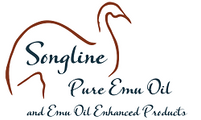Emu Oil For Pets

Benefits of Emu and Camelina Oil for Pets
Omega 3, 6, 7, 9 and many other fatty acids are critical in your pet's diet to help support healthy skin, coat, heart, joints and the immune system. Unfortunately, many commercial dog and cat foods don't include enough of these nutrients in their formulas.
Pure Emu Oil alone is great for pets, however, based on Nutritional Studies Emu Oil alone did not provide the optimum ratio of Omega 3, 6 and 9 - so we created Mr Squigglemire's Multi-Omegas for Pets which combines Emu and Organic Camelina Oils to achieve that optimum blend.
Signs of Omega Deficiencies in Pets:
Dull Dry Coat: Hair-coats which are dull, brittle, and dry often respond to supplementation with essential fatty acids, especially Omega 6. It has also been found that in some cases of seborrhea, there is a deficiency of Omega 6 in the skin.
Hot Spots and Cracked Paws:Can be signs of multiple omega deficiency and quickly respond to both topical and internal application of this product.
Yeast Infections: Fatty acids have been shown to slow down the growth of Malassezia pachydermatis, a common yeast infection in dogs and cats, in the laboratory. It is thought, these fatty acids may play a beneficial role in the treatment of this yeast infection on the skin and ears in dogs and cats.
Arthritis: Research is showing that omega-3 fatty acids may be helpful in reducing the inflammation associated with arthritis.
Other Inflammatory Diseases: Other diseases which are accompanied by inflammation such as ulcerative colitis, inflammatory bowel disease, and rheumatoid arthritis may respond to the anti-inflammatory effects of certain fatty acids.
Preventing Atopy (allergies to inhaled substances such as pollen and molds): Researchers have suggested that fatty acid supplements may be useful to prevent atopy from developing in young animals. The theory is that pregnant atopic mothers have a decreased amount of prostaglandins (a group of hormone-like lipid compounds that are derived enzymatically from fatty acids) in their systems. If the mothers are deficient in PGE, their offspring may be more likely to develop abnormal immune systems themselves. Since Omega 6 conversions cause the release of prostaglandins, giving Omega 6 to a pregnant female in the last month of pregnancy and during lactation may decrease the incidence of the offspring developing atopy.
Eyes: In addition to their effects on the developing immune system, omega-3 fatty acids are also essential for the proper development of the retina and visual cortex.
Heart Problems: Evidence suggests, omega-3 fatty acids may prevent certain cardiac problems as well. Ventricular arrhythmias in dogs have been prevented and high blood pressure has been reduced in dogs supplemented with fatty acids. Animals prone to thromboembolisms may be helped by the anti-clotting effect fatty acids have on platelets.
